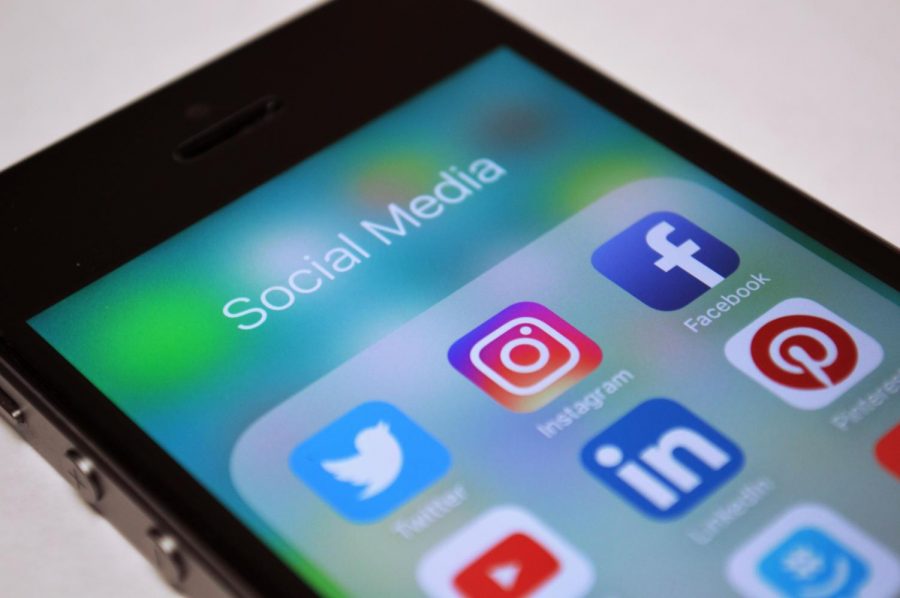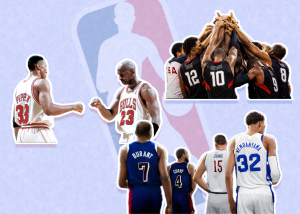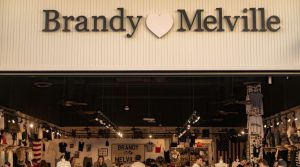The Pros and Cons of the Use of Social Media
November 1, 2020
Pro:
Social Media is used by almost 50 percent of the world’s population, meaning more than 3 billion people use social media. Social media is an important part of teenagers’ lives because it connects thousands of people around the world and it also gives users the opportunity to share their ideas.
Social media was created in 1997 in order to connect people around the world. According to History Cooperative, the website Six Degrees, which is considered to be the first social network, had around 3.5 million users. Before social media, it was hard for people to connect with others that lived far away, but with the creation of social media, billions of users are able to connect with one another. “Social media allows me to stay in contact with friends I’ve met that live very far away from me. I follow them on Instagram, and I’ve even made friends in Estonia and Germany that I still Snapchat!” senior Sydney Gong said.
Not only does social media connect people, but it also gives users a platform to show off their talents in pictures or videos. Users can find a community of people with similar talents and build off of each other or help one another develop their skills.
For some lucky few, posting their talents online could lead to major success when an agent sees their work, recognizes their talent, and helps them create a profitable future. Before social media, the way for people to get their talents broadcasted across the world would be seeking help from a talent agency, but now people can spread their talents on social media for free. However, major success does not only stem from an agent discovering someone. Social media users have the possibility to gather a huge loyal following that can help them obtain their fame. Both Justin Beiber and Charlie D’Amelio started their careers by posting on social media networks. According to the New Yorker, “Charli D’Amelio is a soft-spoken, Connecticut-bred high schooler who performs short dance routines, often in her bedroom. Since joining the app last spring, D’Amelio has amassed more than six billion likes and eighty-two million followers.” Anyone has the potential to become famous on social media, D’Amelio was just an average high school student until she became known on social media.
Media networks allow anyone to express their thoughts on a wide range of topics, whether about politics or phenomenons like the infamous 2015 white and gold or blue and black dress. “I think it’s fun to kind of explore my interests online and have conversations with others,” Nishad Elias said. Social media users bonded over discussing what color this dress was, which was a great way for millions of people to connect with others and bond over a mutual agreement.
Currently, social media is playing a large role in the presidential debates. According to the education site ThoughtCo, “The prevalence of social media in politics has made elected officials and candidates more accountable and accessible to voters. And the ability to publish content and broadcast it to millions of people instantaneously allows campaigns to carefully manage their candidates’ images based on rich sets of analytics in real time and at almost no cost.” Social media allows news to spread extremely fast, for virtually no cost, and allows billions of people to be engaged and voice their own opinions on issues.
To some, social media is just a way for teenagers to waste time, but to others, it is the start of a successful career, a way to influence the world with their ideas, or a way to learn. “I think being able to discuss things on the internet can be extremely helpful. I use it to keep in touch with friends who live far away and it can be used to spread positive messages. The internet has also allowed for greater transfer of information,” junior Giri Mas said. Social media plays such a significant part in today’s world and without it, the way we spread our ideas, connect with others, and get information would be drastically different.
Con:
To many people social media might seem like a free way to express themselves, but shadowed behind all of the positives there lies a plethora of negatives. Social media sells users’ information, creates divides about issues, and negatively impacts people by harming their mental health.
Most people think that social media platforms make their money through ads, but while that is true, social media networks also make a profit from users’ information. According to Forbes, “Social media platforms often generate the majority of their revenue through selling hyper targeted advertising based on algorithmically mining every second of their unwilling and unwitting users’ lives.” Social media tracks which content the users like and the amount of time they spend looking at different posts. The information they gather on the user is then utilized to target the user with ads specifically picked for them. Ad companies pay a premium price for social media sites to display their ads to users who are likely to interact with them. The Netflix documentary, The Social Dilemma, nicely sums up the fact that nothing is free in the expression, “If the service is free, then you are the product.”
Social media created an algorithm which is intended to get users to stay on the page for as long as possible and to do this the algorithm shows the user things they want to see. According to Sprout Social (a social media management platform), “Social networks prioritize which content a user sees in their feed first by the likelihood that they’ll actually want to see it.” Social media plays a big role in the spread of news and ideas about politics and other important issues. Due to the algorithm, people are only seeing one side of a political argument, and this creates a major problem. According to Mashable, “So, for example, if you’re a big Donald Trump supporter and follow your favorite Fox News pundits, the social media algorithms are going to recommend to you more right-wing pundits to watch and more pro-Trump content to consume.” Most people go on social media and assume that they are seeing all aspects of an issue, but in reality social media tends to show them only one side, which can lead to uneducated decision making.
Another downside of social media is that it creates a platform for cyber bullying. Social media is an essential part of teenagers’ lives. Teenagers are addicted to social media, according to Social Buddy, teenagers average three hours on social media a day. People seek the approval of others through their follower counts and number of likes they get. Social media encourages people to constantly compare themselves to others. “It is very easy to compare yourself to others because on social media you can make your life look so perfect, when in reality it probably isn’t. Especially now, I along with many other people look to social media influencers and constantly compare my life with theirs,” junior Riley Geoge said. For too many people, repeatedly comparing their life to others has hurt their mental health: according to an article published in 2019 by The Guardian, “Almost 40 [percent] of girls who spend more than five hours a day on social media show symptoms of depression.”
For an unlucky few, this depression turns fatal: suicide rates have been linked to the increase in use of social media. The Social Dilemma states, “The number of teenage girls out of 100,000 in this country who were admitted to a hospital every year because they cut themselves or otherwise harmed themselves, that number was pretty stable until around 2010, 2011, and then it begins going way up. It’s up 62 percent for older teen girls. It’s up 189 percent for the preteen girls…Even more horrifying, we see the same pattern with suicide.The older teen girls, 15 to 19 years old, they’re up 70 percent, compared to the first decade of this century.”
Social media users need to understand the consequences of using these platforms and must be aware of the information that is collected from them. Social media is harmful because not only does it use your information for a profit, but it also creates divides within our political system.








